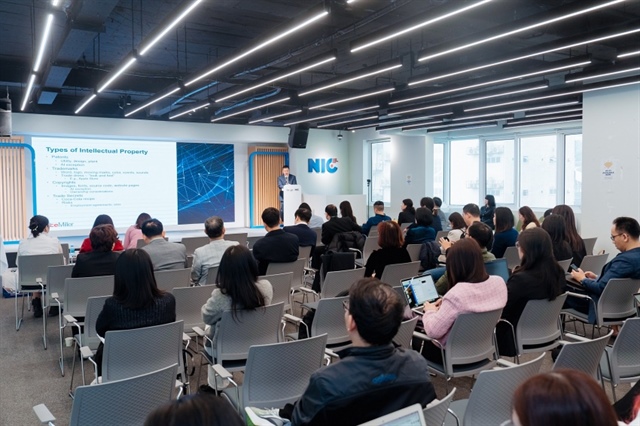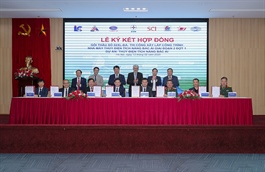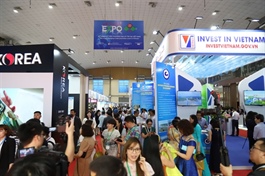Vietnamese enterprises should improve IP knowledge to succeed in US
Vietnamese enterprises should improve IP knowledge to succeed in US
Understanding intellectual property (IP) protection is one of the core factors Vietnamese enterprises should focus on to exploit the US market effectively.
A workshop on protecting IP and navigating legal challenges - a guide for Vietnamese companies engaging with the US market, took place on February 13 at the headquarters of the National Innovation Centre (NIC) in Hanoi’s Cau Giay district.

The workshop took place at NIC headquarters |
Do Tien Thinh, NIC's deputy director, said Vietnam is aiming for economic growth of 8 per cent this year with a goal to reach double-digit growth from 2026-2030. This would put Vietnam on the path to become a developed country by 2045 based on science-technology development and innovation, so IP protection needs more attention.
"The United States is a large market, opening up great opportunities for Vietnamese businesses to expand their market and increase value. However, this market is also one of the most demanding in the world with a complex legal system, and high requirements for compliance with regulations related to IP, which is a big challenge for many Vietnamese businesses," Thinh said.
Legal experts from Ice Miller LLP and Duane Morris LLP provided practical insights into how Vietnamese businesses can protect their IP, raise international capital, and optimise their IP assets to work with partners and expand in the US market.
Justin Swindells, a partner at Ice Miller LLP, said that innovation is good, but the rights of the inventor and author should be better protected by the state. This is very important in the US. People often think that IP costs are high, but they are not as much as the cost and effort spent on research and development to create a product.
He introduced different types of IP, including patents (utility, design, plant, AI exception), trademarks (word, logo, moving marks, colour, scents, sound, trade dress), copyrights (images, fonts, source code, website pages), and trade secrets (Coca- Cola recipe), and risks.
"It is necessary to combine many forms of IP to create a stronghold to protect the rights and interests of individuals and businesses. These do not overlap, do not cancel each other out, but coexist," Swindells said. "Startups should pay more attention to IP because the valuation of a startup depends a lot on intangible assets, which should be protected by IP."
IP offers a great competitive advantage, hinders the development of competitors in the same industry, and prevents violations.
Mai Zyamris also from Ice Miller LLP, spoke about the economic impact of IP assets. In the US, IP-intensive industries accounted for 41 per cent of total GDP, adding $7.8 trillion to the economy in 2019. In the EU, IP-intensive industries generate 45 per cent of total GDP and support 63 million jobs. 80 per cent of the value of S&P 500 companies comes from intangible assets like patents, trademarks, copyrights, and trade secrets.
The global licensing market was valued at $408 billion in 2022 and is projected to grow rapidly. Companies investing in research and development and IP report 30 per cent higher profits on average. IP asset sales and acquisitions offer ownership rights to cutting-edge technologies, as well as enhance company valuations and growth potential.
"However, we should consider IP due diligence through assessing owned, licensed, and third-party IP, and identifying IP disputes and potential infringements. Integration of IP portfolios post-M&A should harmonise IP management practices, ensure seamless integration of acquired IP assets, and integrate IP portfolios post-M&A," Zyamris said.
"IP is not only a tool to protect businesses but also a lever to help businesses develop and attract investment. Building a strong IP portfolio will help Vietnamese businesses compete more effectively in the international market," she emphasised.
Vietnamese companies can develop, protect, and maximise the value of their IP assets through strategic approaches such as M&A, licensing, and collaboration. "Businesses should see the importance of a strategic approach to IP management from the outset, recognise the complexities, and seek expert assistance to navigate potential challenges," she added.
An expert from Duane Morris LLP soke about the advantages of establishing a company in the US or Singapore to access funding from venture capital and strategic investors. He also mentioned legal requirements when transferring capital abroad from Vietnam, procedures for applying for an overseas investment registration certificate, and regulations on foreign compliance.
According to the General Statistics Office under the Ministry of Planning and Investment, in 2024, Vietnam's total import and export turnover reached $786.29 billion, an increase of 15.4 per cent on-year. The US is the largest export market. In January 2025, the total import and export turnover between Vietnam and the US reached $11.1 billion. Vietnam has become the eighth-largest trading partner of the US and the fourth-largest export market for the US in ASEAN.



























